Most commonly known as “pins-and-needles,” nearly everyone has experienced this sensation at some point in their life. Usually, this is viewed as more of an inconvenience and not something to cause concern. Numbness and tingling are common symptoms that can be caused by a variety of conditions. While these symptoms can be annoying, they usually aren’t painful. However, if the tingling and numbness persist, it’s important to see a doctor to rule out any serious underlying causes.
This article will cover what causes numbness and tingling, when it could be something to be concerned about, and how a chiropractor can help.

One potential cause of tingling and numbness is compressed nerves. This can happen when the bones in your spine put pressure on the nerves. Another potential cause of tingling and numbness is poor circulation. This can happen if the blood vessels that supply blood to your extremities are constricted. Chiropractic care can help to improve circulation and relieve tingling and numbness.
If you’re experiencing tingling and numbness, make an appointment with the chiropractors at Thrive! Wellness Center and see how they can help provide relief.
What is ‘Numbness and Tingling’?
Numbness is a loss of sensation in an area of the body. Tingling is a pins-and-needles sensation that can be caused by a variety of conditions. These sensations can occur anywhere in the body, but they’re most common in the extremities.
These sensations can be categorized into two different areas:
Paresthesia: The sensation of tingling, prickling, pricking, or burning of the skin with no apparent long-term physical effect. The most common form of paresthesia is known as “pins and needles” or transient paresthesia. Paresthesia can also be caused by compression of nerves, prolonged pressure on the skin, and certain medical conditions.
Dysesthesia: An unpleasant, abnormal sensation that’s often described as burning, aching, or prickling. Dysesthesia can be caused by a variety of conditions, including nerve damage, diabetes, and certain medications.
Paresthesia is significantly more common than dysesthesia.
Numbness and tingling can also be categorized as either temporary or chronic. Temporary episodes are often caused by sitting in the same position for too long or sleeping in an awkward position. Unfortunately, sometimes there’s no ‘obvious cause’ and the numbness and tingling may be pointing to a bigger issue in the body.
Chronic numbness and tingling can be caused by a variety of conditions, including:
– Compressed nerves
– Poor circulation
– Vitamin deficiencies
– Carpal tunnel syndrome
– Diabetes
– Multiple sclerosis
– Peripheral neuropathy
What Causes Extremity Tingling?
There are a number of potential causes of extremity tingling, including:
Compressed nerves: Compression of the nerves that travel to your extremities can cause tingling and numbness. This can happen when the bones in your spine put pressure on the nerves – enough so to cause nerve damage. Inflammation or swelling of the spinal cord can place pressure on one or more nerves as well.
Poor circulation: Poor circulation can cause tingling and numbness. This can happen if the blood vessels that supply blood to your extremities are constricted. Chiropractic care can help to improve circulation and relieve tingling and numbness.
Vitamin deficiencies: Vitamin B12, vitamin B6, vitamin D, and magnesium deficiencies can all cause tingling and numbness. Taking supplements or eating foods that are rich in these vitamins and minerals can help to improve your symptoms.
What Causes Compressed Nerves?
Compressed nerves can be caused by a variety of conditions. The most common cause is a herniated disc. A herniated disc occurs when the cushioning between the vertebrae in your spine is damaged. This can cause the disc to bulge out and put pressure on the nerves.
In other cases, severe inflammation of the brain and spinal cord can cause loss of sensation in the extremities. Other causes of compressed nerves include:
-Bone spurs
-Arthritis
-Spinal stenosis (narrowing of the spinal canal)
-Trauma or injury
What Causes Poor Circulation?
There are many things that can cause poor circulation, including:
-Atherosclerosis (hardening of the arteries)
-Diabetes
-Peripheral artery disease
-Raynaud’s disease
-Venous insufficiency
What Causes Vitamin Deficiencies?
Vitamin deficiencies can be caused by a number of conditions, including:
-An inadequate diet
-Lack of sunlight
-Certain medications
-Alcohol use
If you’re experiencing tingling and numbness, make an appointment with a chiropractor to see if they can help. Blood tests can be performed to detect vitamin deficiencies, diabetes, liver or kidney dysfunction, other metabolic disorders, and signs of abnormal immune system activity.
Could it Be a Sign of Something More Serious?
While numbness and tingling are usually nothing to worry about, there are some cases where they can be a sign of something more serious.
Carpel Tunnel Syndrome
Carpel tunnel syndrome is a condition that occurs when the median nerve, which runs from the forearm to the hand, becomes compressed. It’s very common for people who work in jobs where they’re making repetitive motions, especially typing at a computer.
The symptoms of carpal tunnel syndrome include tingling, numbness, and pain in the hand and fingers. A chiropractor can help to relieve the pressure on the median nerve and improve your symptoms.
Diabetes
Tingling and numbness can also be caused by diabetes. Diabetes is a condition that causes excess sugar to build up in the blood, which can damage the nerves. If you have diabetes, it’s important to manage your blood sugar levels carefully. With diabetes, you can also experience diabetic neuropathy (similar to peripheral neuropathy). This is when high blood sugar can cause nerve damage to the arms and legs.
Multiple Sclerosis
Multiple sclerosis (MS) is a condition that damages the nerves. It can cause a variety of symptoms, including tingling, numbness, and weakness. According to The National Multiple Sclerosis Society, one of the most common early signs of MS is numbness and tingling. If you have these symptoms, it’s important to see your doctor for an evaluation.
Peripheral Neuropathy
This condition is a result of damage to the nerves located outside the brain and spinal cord. The blood vessels are constricted, and it stops the blood vessels’ supply of nutrients to the peripheral nerves. Pressures on peripheral nerves caused by enlarged blood vessels can also lead to peripheral neuropathy. People with diabetes, smokers, and alcoholics are prone to peripheral neuropathy. It can also radiate to other problems in the body, like digestion, urination, and circulation.
If you experience sudden or severe numbness and tingling, it could be a sign of a stroke or transient ischemic attack (TIA). If you have any of the following symptoms, please call 911 or seek emergency medical attention:
-Sudden numbness or tingling in the face, arm, or leg (especially on one side of the body)
-Sudden confusion, trouble speaking, or difficulty understanding speech
-Sudden trouble seeing in one or both eyes
-Sudden trouble walking, dizziness, loss of balance or coordination
-Sudden severe headache with no known cause
If you’re experiencing other symptoms along with numbness and tingling, it’s important to see a doctor right away. These symptoms can include:
-Fever
-Unexplained weight loss
-Unexplained weakness in your legs
-Chest pain
-Difficulty breathing
-Swelling in your legs or feet
If you’re experiencing any of these symptoms, don’t delay. Make an appointment with a doctor right away to rule out more serious conditions and get the help you need.
Why Seek Chiropractic Care?
Chiropractors are trained to treat conditions that cause tingling and numbness. They can help to relieve the pressure on nerves and improve circulation.
Seeking medical attention can also help rule out if there’s a more serious health issue that needs to be addressed.
A chiropractor will conduct a series of tests, imaging tests, and a physical examination. They will also review your medical history and see if there are other tests needed to determine what could be causing this.
In some cases, they may also recommend vitamin supplements or changes to your diet. If you’re looking for an alternative to medication, chiropractic care may be right for you.
A chiropractor can perform a series of manual manipulations to improve blood flow and reduce pressure on the nerves. Circulation plays a big role when we feel the sensation of numbness and tingling.
There may be no obvious cause for numbness and tingling. This is why when you lay in one position for too long and your arm “falls asleep,” we don’t actually mean it fell asleep – but we know we need to move it around to “wake it up.” When we improve circulation, it can help to relieve the symptoms of numbness and tingling.
Other Ways to Improve Circulation
In addition to chiropractic care, there are other things you can do to improve circulation and relieve the symptoms of numbness and tingling.
-Exercise regularly
-Stretch regularly
-Stay hydrated
-Don’t smoke
-Eat a healthy diet
-Maintain a healthy weight
-Wear loose-fitting clothing
-Elevate your legs when possible
Call Thrive! Wellness Center Today
If you’re experiencing numbness and tingling, don’t wait to get help. We’ll work with you to determine the cause of your symptoms and create a treatment plan that’s right for you.
Our team understands what to look for and how to help our patients live their best, healthiest lives. For more information, call (727) 381-3456 or contact Thrive! Wellness Center here.

